Recep Tayyip Erdoğan
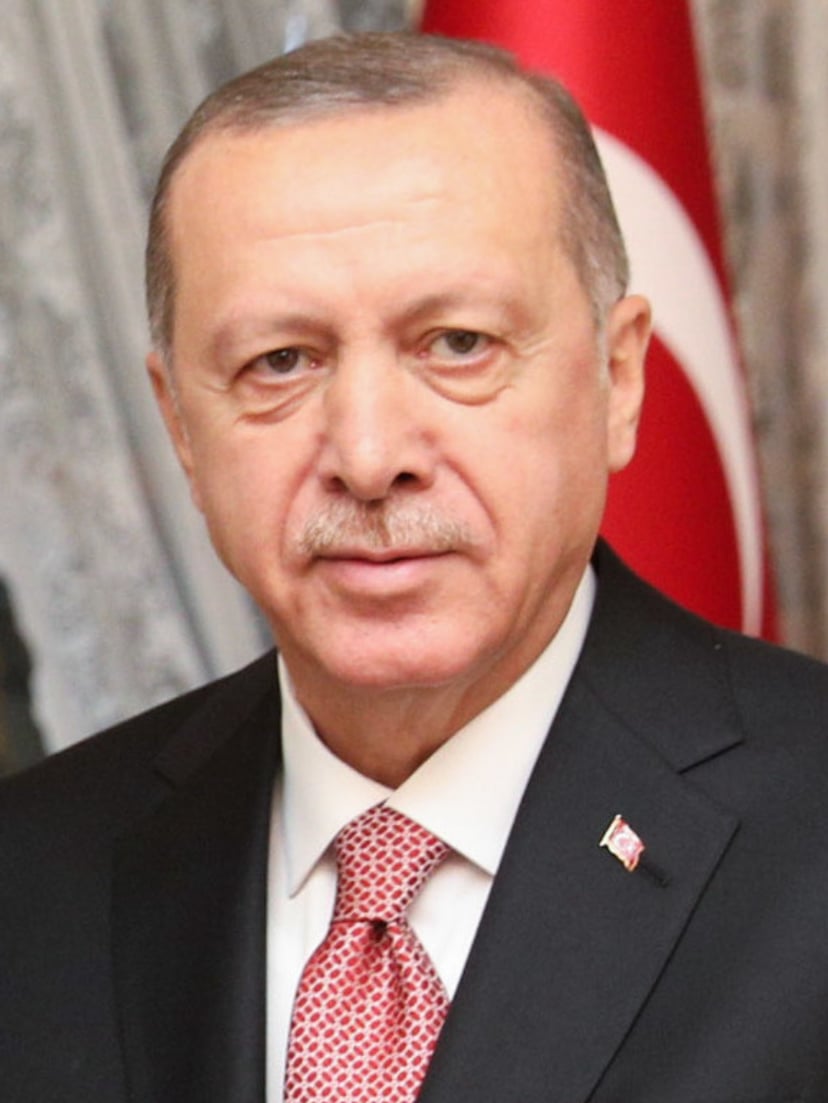
Recep Tayyip Erdoğan

Recep Tayyip Erdoğan | |
|---|---|
| 12th President of Turkey | |
| Assumed office 28 August 2014 | |
| Prime Minister | Ahmet Davutoğlu Binali Yıldırım |
| Vice President | Fuat Oktay |
| Preceded by | Abdullah Gül |
| Leader of the Justice and Development Party | |
| Assumed office 21 May 2017 | |
| Preceded by | Binali Yıldırım |
| In office 14 August 2001 – 27 August 2014 | |
| Preceded by | Position established |
| Succeeded by | Ahmet Davutoğlu |
| Prime Minister of Turkey | |
| In office 14 March 2003 – 28 August 2014 | |
| President | Ahmet Necdet Sezer Abdullah Gül |
| Deputy | Cabinet I(2003–2007)
Cabinet II(2007–2011)
Cabinet III(2011–2014)
|
| Preceded by | Abdullah Gül |
| Succeeded by | Ahmet Davutoğlu |
| Mayor of Istanbul | |
| In office 27 March 1994 – 6 November 1998 | |
| Preceded by | Nurettin Sözen |
| Succeeded by | Ali Müfit Gürtuna |
| Member of the Grand National Assembly | |
| In office 9 March 2003 – 28 August 2014 | |
| Constituency |
|
| Personal details | |
| Born | (1954-02-26)26 February 1954 Kasımpaşa, Istanbul, Turkey |
| Political party | Justice and Development Party(2001–2014; 2017–present) |
| Other political affiliations |
|
| Spouse(s) | Emine Gülbaran (m.1978) |
| Children |
|
| Residence | Presidential Complex, Ankara |
| Alma mater | Marmara University[1] |
| Signature |  |
| Website | Government website [471] Personal website [472] |
Recep Tayyip Erdoğan (/ˈɛərdəwæn/;[2] Turkish: [ɾeˈdʒep tajˈjip ˈæɾdoːan] (listen); born 26 February 1954) is a Turkish politician serving as President of Turkey since 2014. He previously served as Prime Minister of Turkey from 2003 to 2014 and as Mayor of Istanbul from 1994 to 1998. He founded the Justice and Development Party (AKP) in 2001, leading it to election victories in 2002, 2007 and 2011 before standing down upon his election as President in 2014. He later returned to the AKP leadership in 2017. Coming from an Islamist political background and as a self-described conservative democrat, he has promoted socially conservative and liberal economic policies in his administration.[3][4]
Erdoğan played football for Kasımpaşa before being elected as the Mayor of Istanbul in 1994, as the candidate of the Islamist Welfare Party. He was later stripped of his position, banned from political office, and imprisoned for four months for inciting religious hatred.[5] Erdoğan subsequently abandoned openly Islamist politics, establishing the moderate conservative AKP in 2001, which he went on to lead to a landslide victory in 2002. With Erdoğan still technically prohibited from holding office, the AKP's co-founder, Abdullah Gül, instead becoming Prime Minister, later to annulling Erdoğan's political ban. After winning a by-election in Siirt in 2003, Erdoğan replaced Gül as Prime Minister, with Gül instead becoming the AKP's candidate for the presidency.[6] Erdoğan led the AKP to two more election victories in 2007 and 2011, before being elected President in 2014, and re-elected in 2018.
The early years of Erdoğan's prime ministership saw advances in negotiations for Turkey's membership of the European Union, an economic recovery following a financial crash in 2001 and investments in infrastructure including roads, airports, and a high-speed train network. He also won two successful constitutional referendums in 2007 and 2010. However, his government remained controversial for its close links with Fethullah Gülen and his Gülen Movement, now designated as a terrorist organisation, with whom the AKP was accused of orchestrating purges against secular bureaucrats and military officers through the Balyoz and Ergenekon trials.[7][8] In late 2012, his government began peace negotiations with the Kurdistan Workers Party (PKK) to end the ongoing PKK insurgency that began in 1978. The ceasefire broke down in 2015, leading to a renewed escalation in conflict. Erdoğan's foreign policy has been described as Neo-Ottoman and has involved attempts to prevent Syrian-Kurdish PYD/YPG forces from gaining ground on the Turkish-Syrian border during the Syrian Civil War.
Erdoğan's government has been accused of democratic backsliding and corruption in later years.[4][9][10][11] Starting with the anti-government protests in 2013, his government imposed growing censorship on the press and social media, imposing blocks on sites such as YouTube, Twitter and Wikipedia.[12] This stalled negotiations related to EU membership. A US$100 billion corruption scandal in 2013 led to the arrests of Erdoğan's close allies, and incriminated Erdoğan.[13][14][15] Following a souring in relations with Gülen, Erdoğan proceeded to purge his supporters from judicial, bureaucratic and military positions. A failed military coup d'état attempt in July 2016 resulted in further purges and a state of emergency. The government claimed that the coup leaders were linked to Gülen, but he has denied any role in it.[16]
As a long standing proponent of changing Turkey's parliamentary system of government into an executive presidency, Erdoğan formed an alliance with the far-right Nationalist Movement Party (MHP) to establish an executive presidency in 2017, where the changes were accepted in a constitutional referendum. The new system of government formally came into place after the 2018 general election, where Erdoğan and the new AKP-MHP People's Alliance was re-elected. He has since been tackling, but also accused of contributing to, the Turkish currency and debt crisis of 2018, which is widely believed to have contributed to his loss in the 2019 local elections in which the ruling party lost control of Ankara and Istanbul for the first time in 25 years.[17][18] After the loss, the Turkish government ordered a re-election in Istanbul, in which the ruling party lost the elections again with an even greater margin.[19][20][21][22] The two successive losses was seen as a huge blow to Erdoğan, who had once said that if his party "lost Istanbul, we would lose Turkey,"[23] and has been called to be the "beginning of the end" of him.[24][25][26]
Recep Tayyip Erdoğan | |
|---|---|
| 12th President of Turkey | |
| Assumed office 28 August 2014 | |
| Prime Minister | Ahmet Davutoğlu Binali Yıldırım |
| Vice President | Fuat Oktay |
| Preceded by | Abdullah Gül |
| Leader of the Justice and Development Party | |
| Assumed office 21 May 2017 | |
| Preceded by | Binali Yıldırım |
| In office 14 August 2001 – 27 August 2014 | |
| Preceded by | Position established |
| Succeeded by | Ahmet Davutoğlu |
| Prime Minister of Turkey | |
| In office 14 March 2003 – 28 August 2014 | |
| President | Ahmet Necdet Sezer Abdullah Gül |
| Deputy | Cabinet I(2003–2007)
Cabinet II(2007–2011)
Cabinet III(2011–2014)
|
| Preceded by | Abdullah Gül |
| Succeeded by | Ahmet Davutoğlu |
| Mayor of Istanbul | |
| In office 27 March 1994 – 6 November 1998 | |
| Preceded by | Nurettin Sözen |
| Succeeded by | Ali Müfit Gürtuna |
| Member of the Grand National Assembly | |
| In office 9 March 2003 – 28 August 2014 | |
| Constituency |
|
| Personal details | |
| Born | (1954-02-26)26 February 1954 Kasımpaşa, Istanbul, Turkey |
| Political party | Justice and Development Party(2001–2014; 2017–present) |
| Other political affiliations |
|
| Spouse(s) | Emine Gülbaran (m.1978) |
| Children |
|
| Residence | Presidential Complex, Ankara |
| Alma mater | Marmara University[1] |
| Signature |  |
| Website | Government website [471] Personal website [472] |
Personal life and education
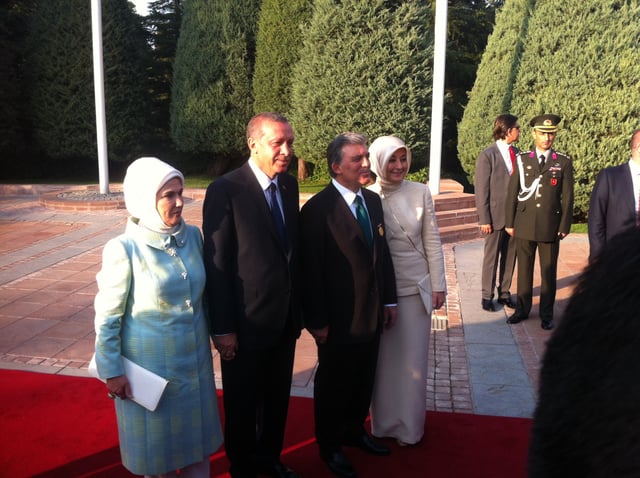
Erdoğan (left) and Abdullah Gül (right) with their respective spouses
Erdoğan was born in the Kasımpaşa neighborhood in Istanbul, to which his family had moved from Rize Province. His parents were Ahmet (1905–88) and Tenzile Erdoğan (née Mutlu; 1924–2011).[30] In August 2003 during his official visit in Tbilisi, Erdoğan reportedly explained his Georgian roots. He told the story of his Adjarian forefathers, which migrated after the Russo-Turkish War (1877–78) from Batumi to Rize.[31][32] According to journalistic investigation held by OdaTV in 2009, his grandfather's nickname "Bakatalı" is claimed to be originating from the village of Bagata, today in the Tskhinvali District of South Ossetia.[33] Georgians in Turkey are basically Muslims, who had arrived during Ottoman times in several waves of migration from Caucasus, due to the Russo-Turkish Wars. However in a 2014 televised interview on the NTV news network, he said, "You wouldn't believe the things they have said about me. They have said I am Georgian ... forgive me for saying this ... even much uglier things, they have even called me an Armenian, but I am Turkish."[34][35]
Erdoğan spent his early childhood in Rize, where his father was a Captain[36] in the Turkish Coast Guard.[37] Erdoğan had a brother Mustafa (b. 1958) and sister Vesile (b. 1965).[36] From his father's first marriage to Havuli Erdoğan (d. 1980), he had two half-brothers: Mehmet (1926–1988) and Hasan (1929–2006).[38] His summer holidays were mostly spent in Güneysu, Rize, where his family originates. Throughout his life he often returned to this spiritual home, and in 2015 he opened a vast mosque on a mountaintop near this village.[39] The family returned to Istanbul when Erdoğan was 13 years old.[37]
As a teenager, he sold lemonade and sesame buns (simit) on the streets of the city's rougher districts to earn extra money.[37] Brought up in an observant Muslim family, Erdoğan graduated from Kasımpaşa Piyale primary school in 1965, and İmam Hatip school, a religious vocational high school, in 1973. He received his high school diploma from Eyüp High School. According to his official biography, he subsequently studied Business Administration at the Aksaray School of Economics and Commercial Sciences, now known as Marmara University's Faculty of Economics and Administrative Sciences[1] — although several Turkish sources dispute that he attended or graduated.[40][41][42]
Erdoğan married Emine Gülbaran (born 1955, Siirt) on 4 July 1978.[46] They have two sons; Ahmet Burak and Necmettin Bilal, and two daughters, Esra and Sümeyye.[46] His father, Ahmet Erdoğan, died in 1988 and his 88-year-old mother, Tenzile Erdoğan, died in 2011.[47] He is a member of the Community of İskenderpaşa, a Turkish sufistic community of Naqshbandi tariqah.[48][49]
Early political career
Erdoğan engaged in politics by joining the National Turkish Student Union, an anti-communist action group. In 1974, he wrote, directed and played the lead role in the play Maskomya, which presented Freemasonry, Communism and Judaism as evil.[50] In 1976, he became the head of the Beyoğlu youth branch of the Islamist National Salvation Party (MSP),[51] and was later promoted to chair of the Istanbul youth branch of the party.
After the 1980 military coup, Erdoğan followed most of Necmettin Erbakan's followers into the Islamist Welfare Party. He became the party's Beyoğlu district chair in 1984, and in 1985 he became the chair of the Istanbul city branch. He was elected to parliament in 1991, but barred from taking his seat.[52]
Mayor of Istanbul (1994–98)
In the local elections of 27 March 1994, Erdoğan was elected Mayor of Istanbul, with a plurality (25.19%) of the popular vote. He was pragmatic in office, tackling many chronic problems in Istanbul including water shortage, pollution and traffic chaos. The water shortage problem was solved with the laying of hundreds of kilometers of new pipelines. The garbage problem was solved with the establishment of state-of-the-art recycling facilities. While Erdoğan was in office, air pollution was reduced through a plan developed to switch to natural gas. He changed the public buses to environmentally friendly ones. The city's traffic and transportation jams were reduced with more than fifty bridges, viaducts, and highways built. He took precautions to prevent corruption, using measures to ensure that municipal funds were used prudently. He paid back a major portion of Istanbul Metropolitan Municipality's two billion dollar debt and invested four billion dollars in the city.[53]
Erdoğan initiated the first roundtable of mayors during the Istanbul conference, which led to a global, organized movement of mayors. A seven-member international jury from the United Nations unanimously awarded Erdoğan the UN-HABITAT award.[54]
Imprisonment
In 1998, the fundamentalist Welfare Party was declared unconstitutional on the grounds of threatening the secularism of Turkey and was shut down by the Turkish constitutional court. Erdoğan became a prominent speaker at demonstrations held by his party colleagues.[55]
In December 1997 in Siirt, Erdoğan recited a poem from a work written by Ziya Gökalp, a pan-Turkish activist of the early 20th century.[56] His recitation included verses translated as "The mosques are our barracks, the domes our helmets, the minarets our bayonets and the faithful our soldiers...."[37] which are not in the original version of the poem. Erdoğan said the poem had been approved by the education ministry to be published in textbooks.[57] Under article 312/2 of the Turkish penal code his recitation was regarded as an incitement to violence and religious or racial hatred.[58] He was given a ten-month prison sentence of which he served four months, from 24 March 1999 to 27 July 1999.[5] Due to his conviction, Erdoğan was forced to give up his mayoral position. The conviction also stipulated a political ban, which prevented him from participating in parliamentary elections.[59] He had appealed for the sentence to be converted to a monetary fine, but it was reduced to 120 days instead.[60] In 2017, this period of Erdoğan's life was made into a film titled Reis.[61]
Prime Minister (2003–14)
General elections

An election campaign poster featuring Erdoğan: "Istanbul is Ready, Target 2023", Taksim Square, Istanbul.
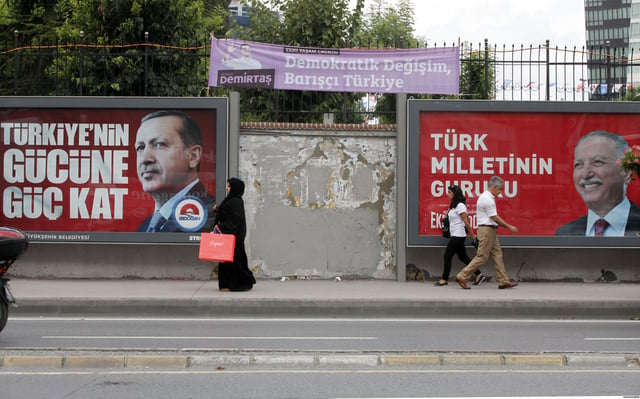
Posters of Erdoğan and his rival Ekmeleddin İhsanoğlu during 2014 presidential election, Istanbul
The elections of 2002 were the first elections in which Erdoğan participated as a party leader. All parties previously elected to parliament failed to win enough votes to re-enter the parliament. The AKP won 34.3% of the national vote and formed the new government. Turkish stocks rose more than 7% on Monday morning. Politicians of the previous generation, such as Ecevit, Bahceli, Yılmaz and Çiller, resigned. The second largest party, the CHP, received 19.4% of the votes. The AKP won a landslide victory in the parliament, taking nearly two-thirds of the seats. Erdoğan could not become Prime Minister as he was still banned from politics by the judiciary for his speech in Siirt. Gül became the Prime Minister instead. In December 2002, the Supreme Election Board canceled the general election results from Siirt due to voting irregularities and scheduled a new election for 9 February 2003. By this time, party leader Erdoğan was able to run for parliament due to a legal change made possible by the opposition Republican People's Party. The AKP duly listed Erdoğan as a candidate for the rescheduled election, which he won, becoming Prime Minister after Gül handed over the post.[62]
On 14 April 2007, an estimated 300,000 people marched in Ankara to protest against the possible candidacy of Erdoğan in the 2007 presidential election, afraid that if elected as President, he would alter the secular nature of the Turkish state.[63] Erdoğan announced on 24 April 2007 that the party had nominated Abdullah Gül as the AKP candidate in the presidential election.[64] The protests continued over the next several weeks, with over one million people reported to have turned out at a 29 April rally in Istanbul,[65] tens of thousands at separate protests on 4 May in Manisa and Çanakkale,[66] and one million in İzmir on 13 May.[67]
The stage of the elections of 2007 was set for a fight for legitimacy in the eyes of voters between his government and the CHP. Erdoğan used the event that took place during the ill-fated Presidential elections a few months earlier as a part of the general election campaign of his party. On 22 July 2007, the AKP won an important victory over the opposition, garnering 46.7% of the popular vote. 22 July elections marked only the second time in the Republic of Turkey's history whereby an incumbent governing party won an election by increasing its share of popular support.[68] On 14 March 2008, Turkey's Chief Prosecutor asked the country's Constitutional Court to ban Erdoğan's governing party.[69] The party escaped a ban on 30 July 2008, a year after winning 46.7% of the vote in national elections, although judges did cut the party's public funding by 50%.[70]
In the June 2011 elections, Erdoğan's governing party won 327 seats (49.83% of the popular vote) making Erdoğan the only prime minister in Turkey's history to win three consecutive general elections, each time receiving more votes than the previous election. The second party, the Republican People's Party (CHP), received 135 seats (25.94%), the nationalist MHP received 53 seats (13.01%), and the Independents received 35 seats (6.58%).[71]
Kurdish issue
In 2009, Prime Minister Erdoğan's government announced a plan to help end the quarter-century-long Turkey–Kurdistan Workers' Party conflict that had cost more than 40,000 lives. The government's plan, supported by the European Union, intended to allow the Kurdish language to be used in all broadcast media and political campaigns, and restored Kurdish names to cities and towns that had been given Turkish ones.[72] Erdoğan said, "We took a courageous step to resolve chronic issues that constitute an obstacle along Turkey's development, progression and empowerment".[72] Erdoğan passed a partial amnesty to reduce penalties faced by many members of the Kurdish guerrilla movement PKK who had surrendered to the government.[73] On 23 November 2011, during a televised meeting of his party in Ankara, he apologised on behalf of the state for the Dersim massacre, where many Alevis and Zazas were killed.[74]
Armenian Genocide
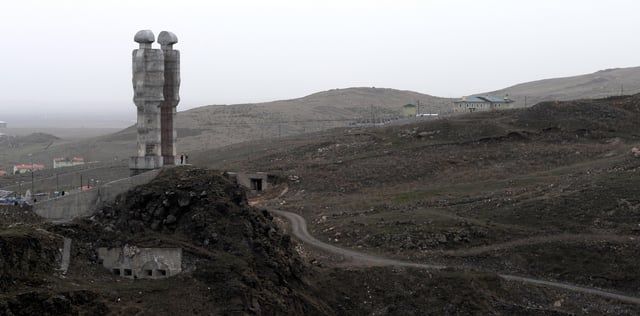
In 2011, Recep Tayyip Erdoğan ordered the Monument to Humanity, a statue dedicated to fostering Armenian and Turkish relations, to be destroyed.
Prime Minister Erdoğan expressed multiple times that Turkey would acknowledge the mass killings of up to 1.5 million Armenians during World War I as genocide only after a thorough investigation by a joint Turkish-Armenian commission consisting of historians, archaeologists, political scientists and other experts.[75][76] In 2005, Erdoğan and the main opposition party leader Deniz Baykal wrote a letter to Armenian President Robert Kocharian, proposing the creation of a joint Turkish-Armenian commission.[77] Armenian Foreign Minister Vartan Oskanian rejected the offer because he asserted that the proposal itself was "insincere and not serious." He added: "This issue cannot be considered at historical level with Turks, who themselves politicized the problem."[78][79]
In December 2008, Erdoğan criticised the I Apologize campaign by Turkish intellectuals to recognize the Armenian Genocide, saying, "I neither accept nor support this campaign. We did not commit a crime, therefore we do not need to apologise ... It will not have any benefit other than stirring up trouble, disturbing our peace and undoing the steps which have been taken."[80] In November 2009, he said, "it is not possible for those who belong to the Muslim faith to carry out genocide."[81][82]
In 2011, Erdoğan ordered the tearing-down of the Statue of Humanity, a Turkish-Armenian friendship monument in Kars, which was commissioned in 2006 and represented a metaphor of the rapprochement of the two countries after many years of dispute over the events of 1915. Erdoğan justified the removal by stating that the monument was offensively close to the tomb of an 11th-century Islamic scholar, and that its shadow ruined the view of that site, while Kars municipality officials said it was illegally erected in a protected area. However, the former mayor of Kars who approved the original construction of the monument said the municipality was destroying not just a "monument to humanity" but "humanity itself". The demolition was not unopposed; among its detractors were several Turkish artists. Two of them, the painter Bedri Baykam and his associate, Pyramid Art Gallery general coordinator Tugba Kurtulmus, were stabbed after a meeting with other artists at the Istanbul Akatlar cultural center.[83]
On 23 April 2014, Erdoğan's office issued a statement in nine languages (including two dialects of Armenian), offering condolences for the mass killings of Armenians and stating that the events of 1915 had inhumane consequences. The statement described the mass killings as the two nations' shared pain and said: "Having experienced events which had inhumane consequences – such as relocation – during the First World War, (it) should not prevent Turks and Armenians from establishing compassion and mutually humane attitudes among one another".[84] The Ottoman Parliament of 1915 had previously used the term "relocation" to describe the purpose of the Tehcir Law, which resulted in the deaths of anywhere between 800,000 and over 1,800,000 Armenian civilians in what is commonly referred to as the Armenian Genocide.[85]
Pope Francis in April 2015, at a special mass in St. Peter's Basilica marking the centenary of the events, described atrocities against Armenian civilians in 1915–1922 as "the first genocide of the 20th century". In protest, Erdoğan recalled the Turkish ambassador from the Vatican, and summoned the Vatican's ambassador, to express "disappointment" at what he called a discriminatory message. He later stated "we don’t carry a stain or a shadow like genocide". US President Barack Obama called for a "full, frank and just acknowledgement of the facts", but again stopped short of labelling it "genocide", despite his campaign promise to do so.[86][87][88]
Human rights
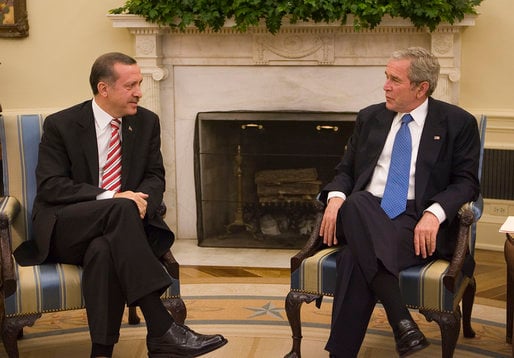
President George W. Bush meets with Erdoğan in the Oval Office on 5 November 2007
During Erdoğan's time as Prime Minister, the far-reaching powers of the 1991 Anti-Terror Law were reduced and the Democratic initiative process was initiated, with the goal to improve democratic standards in general and the rights of ethnic and religious minorities in particular. However, after Turkey's bid to join the European Union stalled, European officials noted a return to more authoritarian ways,[89] notably on freedom of speech,[90][91][92] freedom of the press[93][94][95] and Kurdish minority rights.[96][97][98][99] Demands by activists for the recognition of LGBT rights were publicly rejected by government members,[100] and members of the Turkish LGBT community were insulted by cabinet members.[101]
Reporters Without Borders observed a continuous decrease in Freedom of the Press during Erdoğan's later terms, with a rank of around 100 on the Press Freedom Index during his first term and a rank of 154 out of a total of 179 countries in 2013.[102] Freedom House saw a slight recovery in later years and awarded Turkey a Press Freedom Score of 55/100 in 2012 after a low point of 48/100 in 2006.[103][104][105][106]
Under Erdoğan, the Turkish government tightened the laws on the sale and consumption of alcohol, banning all advertising and increasing the tax on alcoholic beverages.[109]
Economy
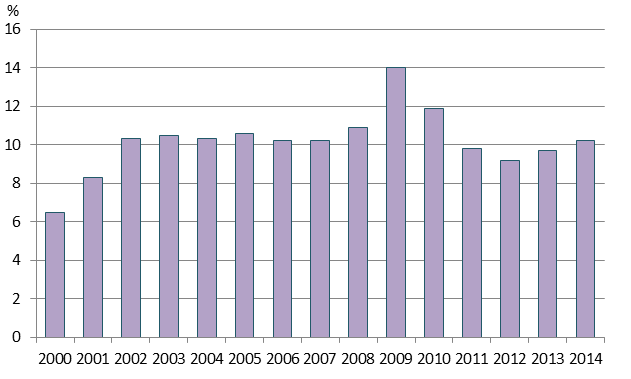
Unemployment rate of Turkey between 2000 and 2014
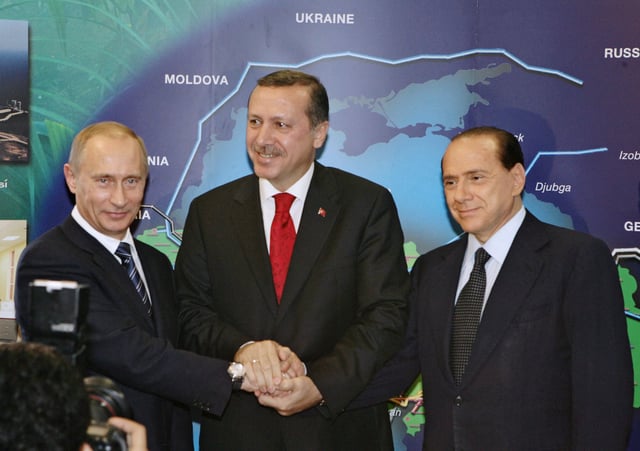
Erdoğan, Vladimir Putin and Silvio Berlusconi at the opening of the Blue Stream gas pipeline in November 2005
In 2002, Erdoğan inherited a Turkish economy that was beginning to recover from a recession as a result of reforms implemented by Kemal Derviş.[110] Erdoğan supported Finance Minister Ali Babacan in enforcing macro-economic policies. Erdoğan tried to attract more foreign investors to Turkey and lifted many government regulations. The cash-flow into the Turkish economy between 2002 and 2012 caused a growth of 64% in real GDP and a 43% increase in GDP per capita; considerably higher numbers were commonly advertised but these did not account for the inflation of the US dollar between 2002 and 2012.[111] The average annual growth in GDP per capita was 3.6%. The growth in real GDP between 2002 and 2012 was higher than the values from developed countries, but was close to average when developing countries are also taken into account. The ranking of the Turkish economy in terms of GDP moved slightly from 17 to 16 during this decade. A major consequence of the policies between 2002 and 2012 was the widening of the current account deficit from 600 million USD to 58 billion USD (2013 est.)[112]
Since 1961, Turkey has signed 19 IMF loan accords. Erdoğan's government satisfied the budgetary and market requirements of the two during his administration and received every loan installment, the only time any Turkish government has done so.[113] Erdoğan inherited a debt of $23.5 billion to the IMF, which was reduced to $0.9 billion in 2012. He decided not to sign a new deal. Turkey's debt to the IMF was thus declared to be completely paid and he announced that the IMF could borrow from Turkey.[114] In 2010, five-year credit default swaps for Turkey's sovereign debt were trading at a record low of 1.17%, below those of nine EU member countries and Russia. In 2002, the Turkish Central Bank had $26.5 billion in reserves. This amount reached $92.2 billion in 2011. During Erdoğan's leadership, inflation fell from 32% to 9.0% in 2004. Since then, Turkish inflation has continued to fluctuate around 9% and is still one of the highest inflation rates in the world.[115] The Turkish public debt as a percentage of annual GDP declined from 74% in 2002 to 39% in 2009. In 2012, Turkey had a lower ratio of public debt to GDP than 21 of 27 members of the European Union and a lower budget deficit to GDP ratio than 23 of them.[116]
In 2003, Erdoğan's government pushed through the Labor Act, a comprehensive reform of Turkey's labor laws. The law greatly expanded the rights of employees, establishing a 45-hour workweek and limiting overtime work to 270 hours a year, provided legal protection against discrimination due to sex, religion, or political affiliation, prohibited discrimination between permanent and temporary workers, entitled employees terminated without "valid cause" to compensation, and mandated written contracts for employment arrangements lasting a year or more.[117][118]
Education
Erdoğan increased the budget of the Ministry of Education from 7.5 billion lira in 2002 to 34 billion lira in 2011, the highest share of the national budget given to one ministry.[119] Before his prime ministership the military received the highest share of the national budget. Compulsory education was increased from eight years to twelve.[120] In 2003, the Turkish government, together with UNICEF, started a campaign called "Come on girls, let's go to school!" (Turkish: Haydi Kızlar Okula!). The goal of this campaign was to close the gender-gap in primary school enrollment through the provision of a quality basic education for all girls, especially in southeast Turkey.[121]
In 2005, the parliament granted amnesty to students expelled from universities before 2003. The amnesty applied to students dismissed on academic or disciplinary grounds.[122] In 2004, textbooks became free of charge and since 2008 every province in Turkey has its own university.[123] During Erdoğan's Premiership, the number of universities in Turkey nearly doubled, from 98 in 2002 to 186 in October 2012.[124]
The Prime Minister kept his campaign promises by starting the f@tih project in which all state schools, from preschool to high school level, received a total of 620,000 smart boards, while tablet computers were distributed to 17 million students and approximately one million teachers and administrators.[125]
In June 2017 a draft proposal by the ministry of education was approved by Erdoğan, in which the curriculum for schools excluded the teaching of the theory of evolution of Charles Darwin by 2019. From then on the teaching will be postponed and start at undergraduate level.[126]
Infrastructure
Under Erdoğan's government, the number of airports in Turkey increased from 26 to 50.[127] Between the founding of the Republic of Turkey in 1923 and 2002, there had been 6000 km of dual carriageway roads created. Between 2002 and 2011, another 13500 km of expressway were built. Due to these measures, the number of motor accidents fell by 50 percent.[128] For the first time in Turkish history, high speed railway lines were constructed, and the country's high-speed train service began in 2009.[129] In 8 years, 1076 km of railway were built and 5449 km of railway renewed. The construction of Marmaray, an undersea rail tunnel under the Bosphorus strait, started in 2004. Construction of the 1.9 km long Yavuz Sultan Selim Bridge began in 2013.[130] The chosen name for the bridge led to protests by Alevis in Turkey because of the role Sultan Selim I, nicknamed "the Grim" due to his cruelty, played in the Ottoman persecution of Alevis.[131]
Justice
In March 2006, the Supreme Board of Judges and Prosecutors (HSYK) held a press conference to publicly protest the obstruction of the appointment of judges to the high courts for over 10 months. The HSYK said Erdoğan wanted to fill the vacant posts with his own appointees. Erdoğan was accused of creating a rift with Turkey's highest court of appeal, the Yargıtay, and high administrative court, the Danıştay. Erdoğan stated that the constitution gave the power to assign these posts to his elected party.[132]
In May 2007, the head of Turkey's High Court asked prosecutors to consider whether Erdoğan should be charged over critical comments regarding the election of Abdullah Gül as President.[132] Erdoğan said the ruling was "a disgrace to the justice system", and criticized the Constitutional Court which had invalidated a presidential vote because a boycott by other parties meant there was no quorum. Prosecutors investigated his earlier comments, including saying it had fired a "bullet at democracy". Tülay Tuğcu, head of the Constitutional Court, condemned Erdoğan for "threats, insults and hostility" towards the justice system.[133]
Women and demographics
Erdoğan supported the continuation of Turkey's high population growth rate and, in 2008, commented that to ensure the Turkish population remained young every family would need to have at least three children.[134][135] He repeated this statement on numerous occasions.[136] In 2010, Turkey's population was estimated at 73,700,000, with a growth rate of 1.21% per annum (2009 figure).[137]
On 26 May 2012, answering the question of a reporter after a UN conference on population and development in Turkey, Erdoğan said that abortion is murder, saying, "You either kill a baby in the mother's womb or you kill it after birth. In many cases [not all], there's no difference."[138]
In a 2010 meeting with women NGO representatives, asked why he kept addressing them exclusively as mothers, Erdoğan said: "I do not believe in the equality of men and women. I believe in equal opportunities. Men and women are different and complementary."[141] In 2014, he addressed the Istanbul Women and Justice Summit of the Women and Democracy Association (Turkish: Kadın ve Demokrasi Derneği, or KADEM): "Our religion [Islam] has defined a position for women [in society]: motherhood. You cannot explain this to feminists because they don't accept the concept of motherhood." Calling for "equivalency" between the genders, he stated: "You cannot bring women and men into equal positions; that is against nature because their nature is different," while reaffirming that full equality regardless of gender before the law should be maintained.[142]
Health care
After assuming power in 2003, Erdoğan's government embarked on a sweeping reform program of the Turkish healthcare system, called the Health Transformation Program (HTP), to greatly increase the quality of healthcare and protect all citizens from financial risks. Its introduction coincided with the period of sustained economic growth, allowing the Turkish government to put greater investments into the healthcare system. As part of the reforms, the "Green Card" program, which provides health benefits to the poor, was expanded in 2004.[143] The reform program aimed at increasing the ratio of private to state-run healthcare, which, along with long queues in state-run hospitals, resulted in the rise of private medical care in Turkey, forcing state-run hospitals to compete by increasing quality.
In April 2006, Erdoğan unveiled a social security reform package demanded by the International Monetary Fund under a loan deal. The move, which Erdoğan called one of the most radical reforms ever, was passed with fierce opposition. Turkey's three social security bodies were united under one roof, bringing equal health services and retirement benefits for members of all three bodies. The previous system had been criticized for reserving the best healthcare for civil servants and relegating others to wait in long queues. Under the second bill, everyone under the age of 18 years was entitled to free health services, irrespective of whether they pay premiums to any social security organization. The bill also envisages a gradual increase in the retirement age: starting from 2036, the retirement age will increase to 65 by 2048 for both women and men.[144]
In January 2008, the Turkish Parliament adopted a law to prohibit smoking in most public places. Erdoğan is outspokenly anti-smoking.[145]
2007, 2010 and 2017 Constitutional Referendums
After the opposition parties deadlocked the 2007 presidential election by boycotting the parliament, the ruling AKP proposed a constitutional reform package. The reform package was first vetoed by president Sezer. Then he applied to the Turkish constitutional court about the reform package, because the president is unable to veto amendments for the second time. The Turkish constitutional court did not find any problems in the packet and 68.95% of the voters supported the constitutional changes.[146] The reforms consisted of: electing the president by popular vote instead of by parliament, reducing the presidential term from seven years to five, allowing the president to stand for re-election for a second term, holding general elections every four years instead of five and reducing the quorum of lawmakers needed for parliamentary decisions from 367 to 184.
Reforming the Constitution was one of the main pledges of the AKP during the 2007 election campaign. The main opposition party CHP was not interested in altering the Constitution on a big scale, making it impossible to form a Constitutional Commission (Anayasa Uzlaşma Komisyonu).[147] The amendments lacked the two-thirds majority needed to instantly become law, but secured 336 votes in the 550 seat parliament – enough to put the proposals to a referendum. The reform package included a number of issues such as the right of individuals to appeal to the highest court, the creation of the ombudsman's office, the possibility to negotiate a nationwide labour contract, gender equality, the ability of civilian courts to convict members of the military, the right of civil servants to go on strike, a privacy law, and the structure of the Constitutional Court. The referendum was agreed by a majority of 58%.[148]
With the new Turkish constitution which got approved in the constitutional referendum on 16 April 2017, Turkey became a country with a Presidential system, the office of prime minister got abolished and the age of candidacy to the parliament was lowered from 25 to 18.[149]
Gezi Park protests
2013 Gezi Park protests against the perceived authoritarianism of Erdoğan and his policies, starting from a small sit-in in Istanbul in defense of a city park.[150] After the police's intense reaction with tear gas, the protests grew each day. Faced by the largest mass protest in a decade, Erdoğan made this controversial remark in a televised speech: "The police were there yesterday, they are there today, and they will be there tomorrow." After weeks of clashes in the streets of Istanbul, his government at first apologized to the protestors[151] and called for a plebiscite, but then ordered a crackdown on the protesters.[150][152]
2013 corruption arrests
In December 2013, Turkish police detained more than 50 people[153] and arrested 16 others, including the general manager of Halkbank and the sons of three government ministers, on charges of corruption.[154] Although Erdoğan blamed foreign ambassadors and pro-Erdoğan newspapers accused the United States or Israel of a plot, outside analysts attribute the arrests to a power struggle between the Prime Minister and Fethullah Gülen. Gülen, who lives in the U.S., leads a religious movement that had supported the AKP's rise to power. In late 2013, Erdoğan's government proposed shutting down Turkish private schools, many of which are funded by Gülen. Gülen's supporters are believed to have wide influence in the police and judiciary in Turkey.[155]
In late December, Hürriyet and Yeni Şafak papers published comments by Erdoğan stating that he believes he is the ultimate target of a corruption and bribery probe of his allies. The Turkish Prime Minister told journalists that anyone attempting to enmesh him in the scandal would be "left empty handed." Erdoğan reshuffled his Cabinet on 25 December, replacing 10 ministers hours after three ministers, whose sons were detained in relation to the probe, resigned.[156]
Telephone recordings and social media
A file containing five audio recordings of conversations between Erdoğan and his son from a 26-hour period beginning 17 December 2013, in which he appeared to be instructing his son to conceal very large amounts of money, was posted to YouTube and widely discussed on social media.[157][158] On 26 February 2014, Erdoğan acknowledged that his telephone had been tapped, but denied that the conversation was real, instead calling it an "immoral montage" that had been "dubbed" by combining other conversations. An analysis by Joshua Marpet of the United States, published by McClatchy, concluded that the recordings were "probably real", and if not, the fabrication was done with a sophistication he had not previously seen.[159]
On the night of 26 February 2014, Turkey's Parliament, dominated by Erdoğan's Justice and Development Party, passed a bill that allowed the government the power to block Internet sites, subject to court review within three days, and granting it access to Internet traffic data. Another bill previously approved by a parliamentary committee would grant the MİT intelligence service access to data held by the government, as well as private institutions and courts. The following day President Abdullah Gül approved placing an investigative agency that appoints judges and prosecutors under the control of Erdoğan's justice minister.[159]
On 20 March, Erdoğan made a speech promising to "rip out the roots" of the Twitter service. Hours later the telecommunications regulator BTK blocked DNS service to the site, citing four court orders the Turkish government had made requiring them to remove content to preserve privacy that had not been heeded. Sources covering the story attributed this to the use of Twitter to share links to the Erdoğan recordings on YouTube.[12][160] Erdoğan also threatened to ban Facebook. However, the block of Twitter proved ineffective, with traffic increasing a record 138%, and #TwitterisblockedinTurkey becoming the top trending term worldwide.[161] To circumvent the block, Google suggested Turks use Google Public DNS at 8.8.8.8 and 8.8.4.4, numbers which were soon graffitied in dozens of locations around Istanbul.[162][163] President Abdullah Gül criticized the Twitter ban, defying it himself.[164][165] Two months later, on 3 June, Turkey's telecommunications watchdog ordered the ban to be lifted, after a ruling by the Constitutional Court.[166]
Foreign policy
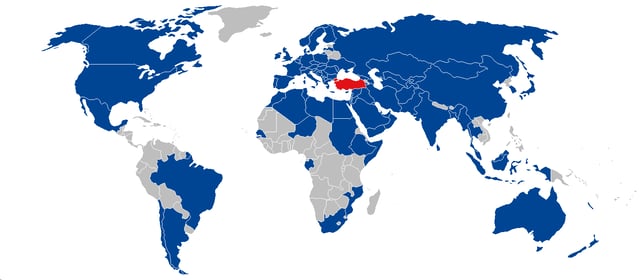
Countries visited by Recep Tayyip Erdoğan as prime minister
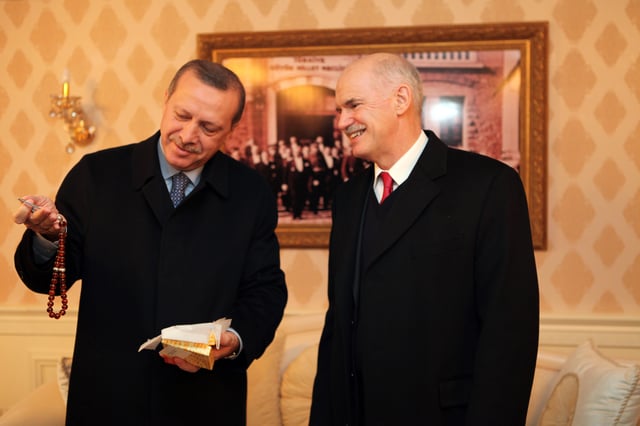
Erdoğan with Greek Prime Minister George Papandreou.
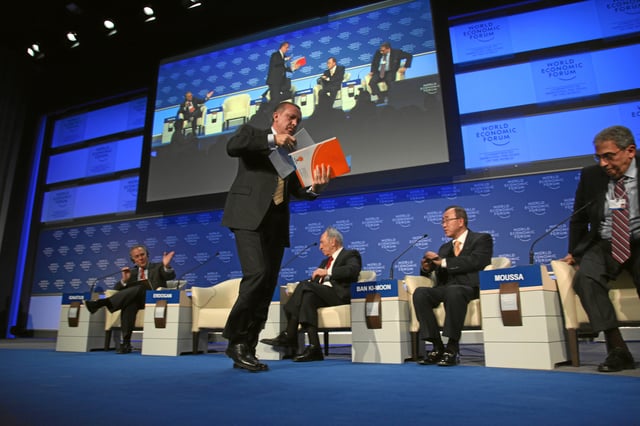
Erdoğan walks out of the session at the World Economic Forum in 2009, vows never to return.
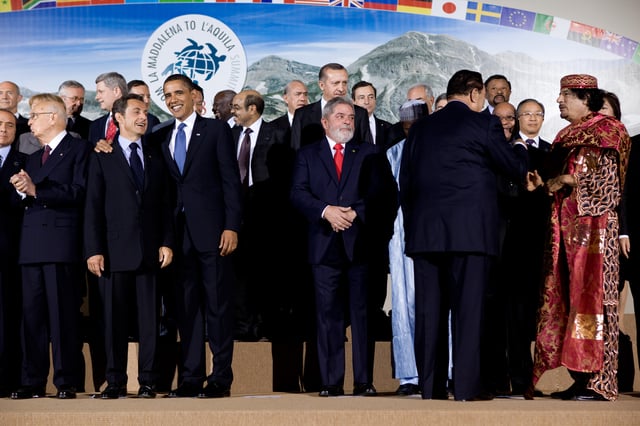
Erdoğan among the world leaders seen here at the G8 summit in 2009
Turkey under Erdoğan was named by the Bush Administration as a part of the "coalition of the willing" that was central to the 2003 invasion of Iraq.[167]
On 3 October 2005 negotiations began for Turkey's accession to the European Union.[168]
Under Erdoğan, Iraq and Turkey signed 48 trade agreements on issues including security, energy, and water. The Turkish government attempted to mend relations with Iraqi Kurdistan by opening a Turkish university in Erbil, and a Turkish consulate in Mosul.[169] Erdoğan's government fostered economic and political relations with Irbil, and Turkey began to consider the Kurdistan Regional Government in northern Iraq as an ally against Maliki's government.[170]
Relations between Greece and Turkey were normalized during Erdoğan's tenure as prime minister. In 2007, Erdoğan and Greek Prime Minister Kostas Karamanlis inaugurated the Greek-Turkish natural gas pipeline giving Caspian gas its first direct Western outlet.[171] Erdoğan and his party strongly supported the EU-backed referendum to reunify Cyprus in 2004.[172] Negotiations about Turkey's possible EU membership came to a standstill in 2009 and 2010, when Turkish ports were closed to Cypriot ships in "revenge" for the economic isolation of the internationally unrecognized Turkish Republic of Northern Cyprus and the failure of the EU to end the isolation, as it had promised in 2004.[173] The Turkish government continues its refusal to recognize the Republic of Cyprus.[174]
Erdoğan condemned the Saudi-led intervention in Bahrain and characterized the Saudi movement as "a new Karbala." He demanded withdrawal of Saudi forces from Bahrain.[175]
Erdoğan visited Egypt on 12 September 2011, soon after Turkey had ejected Israeli ambassadors, cutting off all diplomatic relations with Israel because Israel refused to apologize for the Gaza flotilla raid which killed eight Turkish and one Turco-American.[176] This was the first visit to Egypt by a Prime Minister of Turkey after the Egyptian Revolution of 2011.[176][177]
Erdoğan stated in a 2011 interview that he supported secularism for Egypt, which generated an angry reaction among Islamic movements, especially the Freedom and Justice party – the political wing of the Muslim Brotherhood.[178] However, commentators suggest that by forming an alliance with the military junta during Egypt's transition to democracy, Erdoğan may have tipped the balance in favor of an authoritarian government.[178]
Erdoğan visited Israel on 1 May 2005, a gesture unusual for a leader of a Muslim majority country.[179] During his trip, Erdoğan visited the Yad Vashem, Israel's official memorial to the victims of the Holocaust.[179] The President of Israel Shimon Peres addressed the Turkish parliament during a visit in 2007, the first time an Israeli leader had addressed the legislature of a predominantly Muslim nation.[180] Their relationship worsened at the 2009 World Economic Forum conference over Israel's actions during the Gaza War.[181] Erdoğan was interrupted by the moderator while he was responding to Peres, and left the panel, accusing the moderator of giving Peres more time than all the other panelists combined.[182] Tensions increased further following the Gaza flotilla raid in May 2010. Erdoğan strongly condemned the raid, describing it as "state terrorism", and demanded an Israeli apology.[183] In February 2013, Erdoğan called Zionism a "crime against humanity", comparing it to Islamophobia, antisemitism, and fascism.[184] He later retracted the statement, saying he had been misinterpreted. He said "everyone should know" that his comments were directed at "Israeli policies", especially as regards to "Gaza and the settlements."[185][186] Erdoğan's statements were criticized by UN Secretary-General Ban Ki-moon, among others.[187][188] In August 2013, the Hürriyet reported that Erdoğan had claimed to have evidence of Israel's responsibility for the removal of Morsi from office in Egypt.[189] The Israeli and Egyptian governments dismissed the suggestion.[190][191]
On 12 May 2010, Turkey and Russia signed 17 agreements to enhance cooperation in energy and other fields, including pacts to build Turkey's first nuclear power plant and further plans for an oil pipeline from the Black Sea to the Mediterranean Sea. The leaders of both countries also signed an agreement on visa-free travel, enabling tourists to get into the country for free and stay there for up to 30 days.[192] In May 2010, the Turkish and Somali governments signed a military training agreement, in keeping with the provisions outlined in the Djibouti Peace Process.[193] Turkish Airlines became the first long-distance international commercial airline in two decades to resume flights to and from Mogadishu's Aden Adde International Airport.[194] Turkey also launched various development and infrastructure projects in Somalia including building several hospitals and helping renovate the National Assembly building.[194]
During Erdoğan's term of office, diplomatic relations between Turkey and Syria significantly deteriorated. In 2004, President Bashar al-Assad arrived in Turkey for the first official visit by a Syrian President in 57 years. In late 2004, Erdoğan signed a free trade agreement with Syria. Visa restrictions between the two countries were lifted in 2009, which caused an economic boom in the regions near the Syrian border.[195] However the relationship became strained following the outbreak of conflict in Syria in 2011. Erdoğan said he was trying to "cultivate a favorable relationship with whatever government would take the place of Assad",[196] and began directly supporting the armed opposition in Syria.[197] Erdoğan's policy of providing military training for anti-regime fighters has also created conflict with Syria's ally and neighbor, Iran.[198]
2014 presidential campaign
On 1 July 2014, Erdoğan was named the AKP's presidential candidate in the Turkish presidential election. His candidacy was announced by the Deputy President of the AKP, Mehmet Ali Şahin.
Erdoğan made a speech after the announcement and used the 'Erdoğan logo' for the first time. The logo was criticised because it was very similar to the logo that U.S. President Barack Obama used in the 2008 presidential election.[199]
Erdoğan was elected as the President of Turkey in the first round of the election with 51.79% of the vote, obviating the need for a run-off by winning over 50%. The joint candidate of the CHP, MHP and 13 other opposition parties, former Organisation of Islamic Co-operation general secretary Ekmeleddin İhsanoğlu won 38.44% of the vote. The pro-Kurdish HDP candidate Selahattin Demirtaş won 9.76%.[200]
Electoral fraud
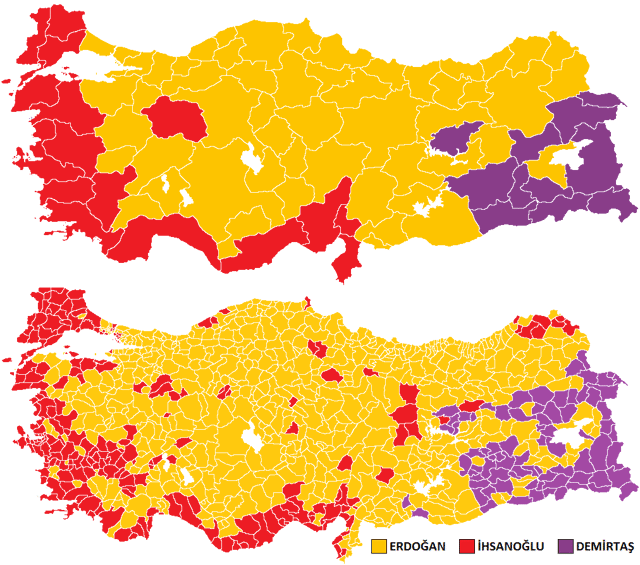
2014 presidential election results.
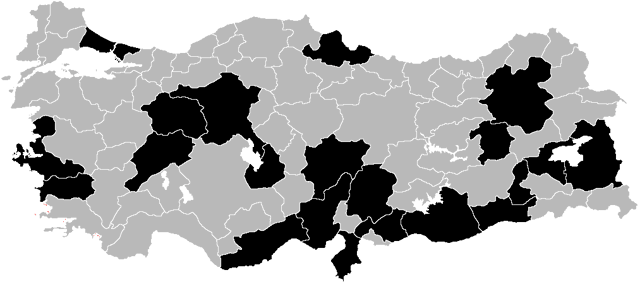
Map showing provinces suffering from power outages during the counting process for the 2014 local elections[210]
Substantial levels of fraud were documented during the 2014 local elections, including the theft and burning of ballots cast both for and against the AKP and the intimidation of officials counting the votes, including European Union Minister Mevlüt Çavuşoğlu, by government forces.[211][212][213][214][215][216] Several cases of opposition votes being counted as invalid and vote totals per ballot box being recorded incorrectly also caused controversy. With an unusually high number of power outages occurring throughout the country while votes were being counted, the government was ridiculed when Energy Minister Taner Yıldız blamed them on cats entering transformers.[217][218][219] Erdoğan was criticised for disregarding the high number of fraud cases and declaring victory none-the-less. Significant cases of misconduct were documented in Yalova, Ankara, Antalya and Ağrı. The Supreme Electoral Council ordered a repeat of the election in Yalova and Ağrı, both of which the AKP had initially narrowly lost to the CHP and BDP respectively.
Despite strong surveillance by citizens during the 2014 presidential election, no serious cases of fraud were documented during the voting or counting process.[220] However, Erdoğan was still heavily scrutinised over what was perceived to be excessive media bias in his favour during the campaigning process.[221]
On 14 June 2018, in a video that was leaked to the public, President Erdogan is caught calling his party members to resort to electoral fraud, by "marking" the votes of an opposition party, HDP, in a bid to consolidate a better position for his own party at the 2018 June elections in Turkey.[222]
Presidency (2014–present)
Erdoğan took the oath of office on 28 August 2014 and became the 12th president of Turkey. He administered the new Prime Minister Ahmet Davutoğlu's oath on 29 August. When asked about his lower-than-expected 51.79% share of the vote, he allegedly responded, "there were even those who did not like the Prophet. I, however, won 52%."[223] Assuming the role of President, Erdoğan was criticized for openly stating that he would not maintain the tradition of presidential neutrality.[224] Erdoğan has also stated his intention to pursue a more active role as President, such as utilising the President's rarely used cabinet-calling powers.[225] The political opposition has argued that Erdoğan will continue to pursue his own political agenda, controlling the government, while his new Prime Minister Ahmet Davutoğlu would be docile and submissive.[3] Furthermore, the domination of loyal Erdoğan supporters in Davutoğlu's cabinet fuelled speculation that Erdoğan intended to exercise substantial control over the government.[226]
Domestic Policy
Presidential palace
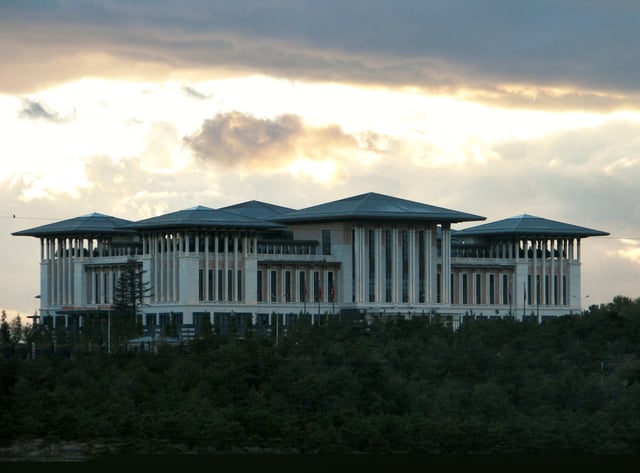
New Presidential Palace in Ankara
Erdoğan has also received criticism for the construction of a new palace called Ak Saray (pure white palace), which occupies approximately 50 acres of Atatürk Forest Farm (AOÇ) in Ankara.[227][228] Since the AOÇ is protected land, several court orders were issued to halt the construction of the new palace, though building work went on nonetheless.[229] The opposition described the move as a clear disregard for the rule of law.[230] The project was subject to heavy criticism and allegations were made; of corruption during the construction process, wildlife destruction and the complete obliteration of the zoo in the AOÇ in order to make way for the new compound.[231] The fact that the palace is technically illegal has led to it being branded as the 'Kaç-Ak Saray', the word kaçak in Turkish meaning 'illegal'.[232]
Ak Saray was originally designed as a new office for the Prime Minister. However, upon assuming the presidency, Erdoğan announced that the palace would become the new Presidential Palace, while the Çankaya Köşkü will be used by the Prime Minister instead. The move was seen as a historic change since the Çankaya Köşkü had been used as the iconic office of the presidency ever since its inception. The Ak Saray has almost 1,000 rooms and cost $350 million (€270 million), leading to huge criticism at a time when mining accidents and workers' rights had been dominating the agenda.[233][234]
On 29 October 2014, Erdoğan was due to hold a Republic Day reception in the new palace to commemorate the 91st anniversary of the Republic of Turkey and to officially inaugurate the Presidential Palace. However, after most invited participants announced that they would boycott the event and a mining accident occurred in the district of Ermenek in Karaman, the reception was cancelled.[235]
Coup d'état attempt
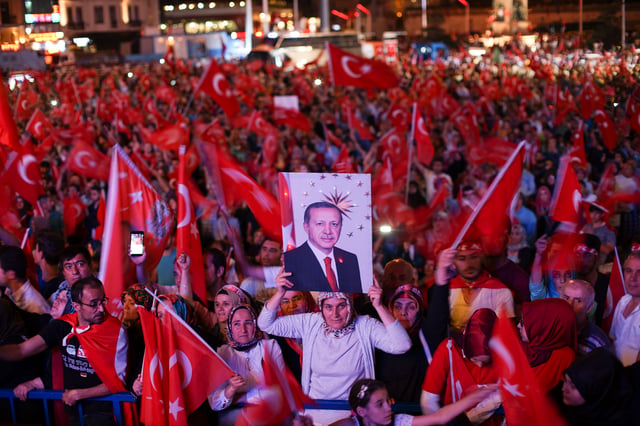
Turkish anti-coup rally in Istanbul, 22 July 2016
On 15 July 2016, a coup d'état was attempted by the military, with aims to remove Erdoğan from government. By the next day, Erdoğan's government managed to reassert effective control in the country.[236] Reportedly, no government official was arrested or harmed, which among other factors raised the suspicion of a false flag event staged by the government itself.[237][238]
Erdoğan, as well as other government officials, have blamed an exiled cleric, and once an ally of Erdoğan, Fethullah Gülen, for staging the coup attempt.[239] Suleyman Soylu, Minister for Labor in Erdoğan's government, accused the US of planning a coup to oust Erdoğan.[240]
Following the coup attempt, there has been a significant deterioration in Turkey-US relations. European and other world leaders have expressed their concerns over the situation in Turkey, with many of them warning Erdoğan not to use the coup attempt as an excuse for crackdown against his opponents.[243]
The rise of ISIS and the collapse of the Kurdish peace process had led to a sharp rise in terror incidents in Turkey until 2016. Erdoğan was accused by his critics of having a 'soft corner' for ISIS.[244] However, after the attempted coup, Erdoğan ordered the Turkish military into Syria to combat ISIS and Kurdish militant groups.[245] Erdoğan's critics have decried purges in the education system and judiciary as undermining the rule of law[246] however Erdoğan supporters argue this is a necessary measure as Gulen-linked schools cheated on entrance exams, requiring a purge in the education system and of the Gulen followers who then entered the judiciary.[247][248]
Erdoğan's plan is "to reconstitute Turkey as a presidential system. The plan would create a centralized system that would enable him to better tackle Turkey's internal and external threats. One of the main hurdles allegedly standing in his way is Fethullah Gulen's movement ..."[249] In the aftermath of the 2016 Turkish coup d'état attempt, a groundswell of national unity and consensus emerged for cracking down on the coup plotters with a National Unity rally held in Turkey that included Islamists, secularists, liberals and nationalists.[250][251] Erdoğan has used this consensus to remove Gulen followers from the bureaucracy, curtail their role in NGOs, Turkey's Ministry of Religious Affairs and the Turkish military, with 149 Generals discharged.[252] In a foreign policy shift Erdoğan ordered the Turkish Armed Forces into battle in Syria and has liberated towns from IS control.[253] As relations with Europe soured over in the aftermath of the attempted coup, Erdoğan developed alternative relationships with Russia,[254][255] Saudi Arabia[256] and a "strategic partnership" with Pakistan,[257][258] with plans to cultivate relations through free trade agreements and deepening military relations for mutual co-operation with Turkey's regional allies.[259][260][261]
Silencing the press
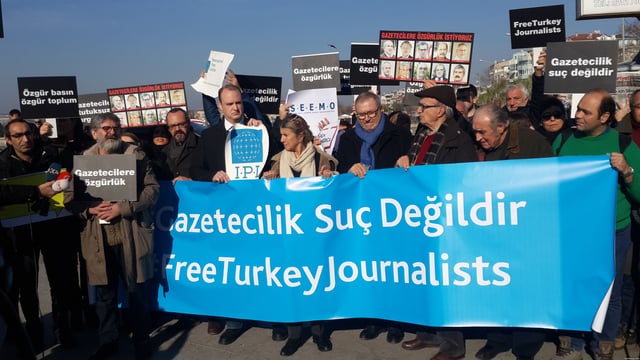
Turkish journalists protesting imprisonment of their colleagues on Human Rights Day, 10 December 2016
President Erdoğan and his government press for court action against the remaining free press in Turkey. The latest newspaper that has been seized is Zaman, in March 2016.[262] After the seizure Morton Abramowitz and Eric Edelman, former U.S. ambassadors to Turkey, condemned President Erdoğan's actions in an opinion piece published by the Washington Post: "Clearly, democracy cannot flourish under Erdoğan now."[263] "The overall pace of reforms in Turkey has not only slowed down but in some key areas, such as freedom of expression and the independence of the judiciary, there has been a regression, which is particularly worrying," rapporteur Kati Piri said in April 2016 after the European Parliament passed its annual progress report on Turkey.[264]
On 22 June 2016, President Recep Tayyip Erdoğan said that he considered himself successful in "destroying" Turkish civil groups "working against the state",[265] a conclusion that had been confirmed some days earlier by Sedat Laçiner, Professor of International Relations and rector of the Çanakkale Onsekiz Mart University: "Outlawing unarmed and peaceful opposition, sentencing people to unfair punishment under erroneous terror accusations, will feed genuine terrorism in Erdoğan's Turkey. Guns and violence will become the sole alternative for legally expressing free thought."[266]
After the coup attempt, over 200 journalists were arrested and over 120 media outlets were closed. Cumhuriyet journalists were detained in November 2016 after a long-standing crackdown on the newspaper. Subsequently, Reporters Without Borders called Erdoğan an "enemy of press freedom" and said that he "hides his aggressive dictatorship under a veneer of democracy".[267]
In April 2017, Turkey blocked all access to Wikipedia over a content dispute.[268]
State of emergency and purges
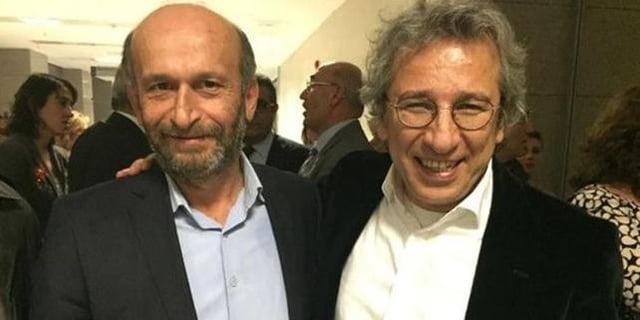
Turkish journalists Can Dündar and Erdem Gül were arrested facing sentences up to life imprisonment.
On 20 July 2016, President Erdoğan declared the state of emergency, citing the coup d'état attempt as justification.[269] It was first scheduled to last three months. The Turkish parliament approved this measure.[270] The state of emergency was later extended for another three months, amidst the ongoing 2016 Turkish purges including comprehensive purges of independent media and detention of tens of thousands of Turkish citizens politically opposed to Erdoğan.[271] More than 50,000 people have been arrested and over 160,000 fired from their jobs by March 2018.[272]
In August 2016, Erdoğan began rounding up journalists who had been publishing, or who were about to publish articles questioning corruption within the Erdoğan administration, and incarcerating them.[273] The number of Turkish journalists jailed by Turkey is higher than any other country, including all of those journalists currently jailed in North Korea, Cuba, Russia, and China combined.[274] In the wake of the coup attempt of July 2016 the Erdoğan administration began rounding up tens of thousands of individuals, both from within the government, and from the public sector, and incarcerating them on charges of alleged "terrorism."[275][276][277] As a result of these arrests, many in the international community complained about the lack of proper judicial process in the incarceration of Erdoğan's opposition.[278]
In April 2017 Erdoğan successfully sponsored legislation effectively making it illegal for the Turkish legislative branch to investigate his executive branch of government.[279] Without the checks and balances of freedom of speech, and the freedom of the Turkish legislature to hold him accountable for his actions, many have likened Turkey's current form of government to a dictatorship with only nominal forms of democracy in practice.[280][281] At the time of Erdoğan's successful passing of the most recent legislation silencing his opposition, United States President Donald Trump called Erdoğan to congratulate him for his "recent referendum victory."[282]
On 29 April 2017 Erdoğan's administration began an internal Internet block of all of the Wikipedia online encyclopedia site via Turkey's domestic Internet filtering system. This blocking action took place after the government had first made a request for Wikipedia to remove what it referred to as "offensive content". In response, Wikipedia co-founder Jimmy Wales replied via a post on Twitter stating, "Access to information is a fundamental human right. Turkish people, I will always stand with you and fight for this right."[283][284]
In January 2016, more than a thousand academics signed a petition criticizing Turkey's military crackdown on ethnic Kurdish towns and neighbourhoods in the east of the country, such as Sur (a district of Diyarbakır), Silvan, Nusaybin, Cizre and Silopi, and asking an end to violence.[285] Erdoğan accused those who signed the petition of "terrorist propaganda", calling them "the darkest of people". He called for action by institutions and universities, stating, "Everyone who benefits from this state but is now an enemy of the state must be punished without further delay."[286] Within days, over 30 of the signatories were arrested, many in dawn-time raids on their homes. Although all were quickly released, nearly half were fired from their jobs, eliciting a denunciation from Turkey's Science Academy for such "wrong and disturbing" treatment.[287] Erdoğan vowed that the academics would pay the price for "falling into a pit of treachery".[288]
On 8 July 2018, Erdogan sacked 18,000 officials for alleged ties to US based cleric Fethullah Gülen, shortly before renewing his term as an executive president. Of those removed, 9000 were police officers with 5000 from the armed forces with the addition of hundreds of academics.[289]
2017 Constitutional Referendum vote
On Sunday, 16 April 2017, a constitutional referendum was held, where the voters in Turkey (and Turkish citizens abroad) voted on a set of 18 proposed amendments to the Constitution of Turkey. The amendments include the replacement of the existing parliamentary system with a presidential system. The post of Prime Minister would be abolished, and the presidency would become an executive post vested with broad executive powers. Parliament would be increased from 550 seats to 600 seats. The referendum also called for changes to the Supreme Board of Judges and Prosecutors.[290]
2018 currency and debt crisis
The Turkish currency and debt crisis of 2018 was caused by the Turkish economy's excessive current account deficit and foreign-currency debt, in combination with Erdoğan's increasing authoritarianism and his unorthodox ideas about interest rate policy.[291][292][293] Economist Paul Krugman described the unfolding crisis as "a classic currency-and-debt crisis, of a kind we've seen many times", adding: "At such a time, the quality of leadership suddenly matters a great deal. You need officials who understand what's happening, can devise a response and have enough credibility that markets give them the benefit of the doubt. Some emerging markets have those things, and they are riding out the turmoil fairly well. The Erdoğan regime has none of that."[294]
2019 Turkish local elections
In the 2019 local elections, the ruling party AKP lost control of Istanbul and Ankara for the first time in 25 years, as well as 5 of Turkey's 6 largest cities. The loss has been widely attributed to Erdoğan's mismanagment of the Turkish economic crisis, rising authoritarianism as well as alleged government inaction on the Syrian refugee crisis.[17][18] Soon after the elections, the Turkish government ordered a re-election in Istanbul, cancelled Ekrem İmamoğlu's mayoral certificate. The decision led to a significant decrease of Erdoğan's and AKP's popularity and his party lost the elections again in June with an even greater margin.[19][20][21][22] The result was seen as a huge blow to Erdoğan, who had once said that if his party 'lost Istanbul, we would lose Turkey.'[295] The opposition's landslide was characterised as the 'beginning of the end' for Erdoğan,[296][297][298] with international commentators calling the re-run a huge government miscalculation that led to a potential İmamoğlu candidacy in the next scheduled presidential election.[296][298] It is suspected that the scale of the government's defeat could provoke a cabinet reshuffle and early general elections, currently scheduled for June 2023.[299][300]
Foreign Policy
Islamic State of Iraq and the Levant
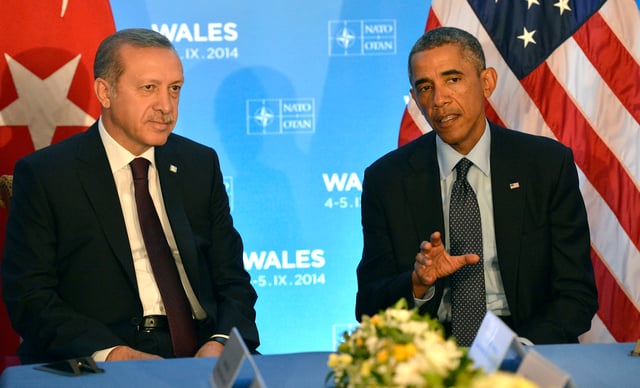
Erdoğan meeting U.S. President Barack Obama during the 2014 Wales summit in Newport, Wales
Amid claims that the Turkish government funds IS fighters, several Kurdish demonstrations broke out near the Turkish-Syrian border in protest against the government's inactivity.[301] These protests escalated during the fighting in the border town of Kobane, with 42 protestors being killed following a brutal police crackdown.[302][303] Voicing concerns that aid to Kurdish fighters would assist PKK rebels in resuming terrorist attacks against Turkey, Erdoğan held bilateral talks with Barack Obama regarding IS during the 5–6 September 2014 NATO summit in Newport, Wales.[304][305] In early October, United States Vice President Joe Biden accused Turkey of funding IS, to which Erdoğan angrily responded, "Biden has to apologize for his statements" adding that if no apology is made, Biden would become "history to me." Biden subsequently apologised.[306] In response to the U.S. request to use İncirlik Air Base to conduct air strikes against IS, Erdoğan demanded that Bashar al-Assad be removed from power first.[307] Turkey lost its bid for a Security Council seat in the United Nations during the 2014 election;[308] the unexpected result[309] is believed to have been a reaction to Erdoğan's hostile treatment of ethnic Kurds fighting ISIS on the Syrian border[310][311] and a rebuke of his willingness to support IS-aligned insurgents opposed to Syrian president Bashar al-Assad.[310][311]
As President, Erdoğan has been a strong advocate of an executive presidency that would boost his own powers and has maintained an active influence over political affairs despite the symbolic nature of his office. In 2016, he was accused of forcing the resignation of Prime Minister Ahmet Davutoğlu due to his scepticism over the proposed presidential system, resulting in his replacement by close ally Binali Yıldırım. He has also come under fire for constructing Ak Saray, the world's largest palace on Atatürk Forest Farm and Zoo for his own use as President and has been repeatedly accused of breaching the constitutional terms of his office by not maintaining political neutrality. In 2015, amid consistent allegations that he maintained financial links with Islamic State of Iraq and the Levant militants, revelations that the state was supplying arms to militant groups in Syria in the 2014 National Intelligence Organisation lorry scandal led to accusations of high treason.[312][313][314] In July 2015, Turkey became involved in the war against ISIS. The Turkish military has simultaneously launched airstrikes against Kurdistan Workers' Party bases in Iraq.[315] In July 2015, a raid by US special forces on a compound housing the Islamic State's "chief financial officer", Abu Sayyaf, produced evidence that Turkish officials directly dealt with ranking IS members.[316]
Bilateral relations
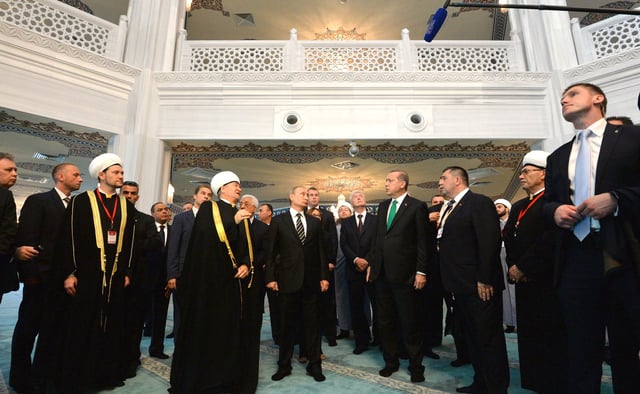
Erdoğan, Russian President Vladimir Putin and Mahmoud Abbas attend Moscow's Cathedral Mosque opening ceremony, 23 September 2015
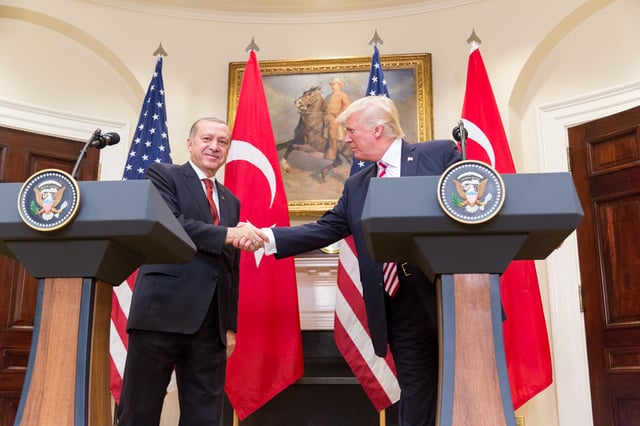
Erdoğan meets with President Donald Trump in the Roosevelt Room at the White House, Washington, D.C., 16 May 2017
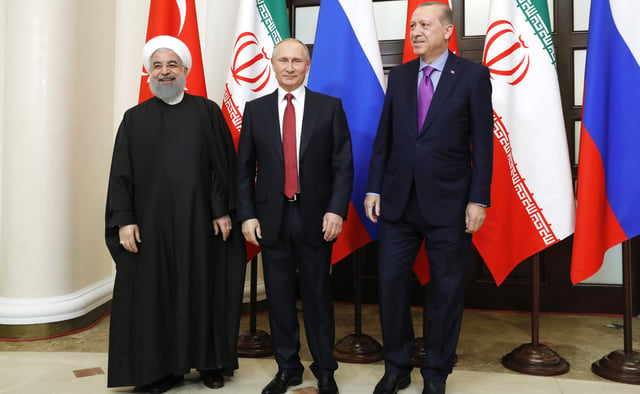
Erdoğan, Putin and Iranian President Hassan Rouhani met in Sochi to discuss Syria, 22 November 2017
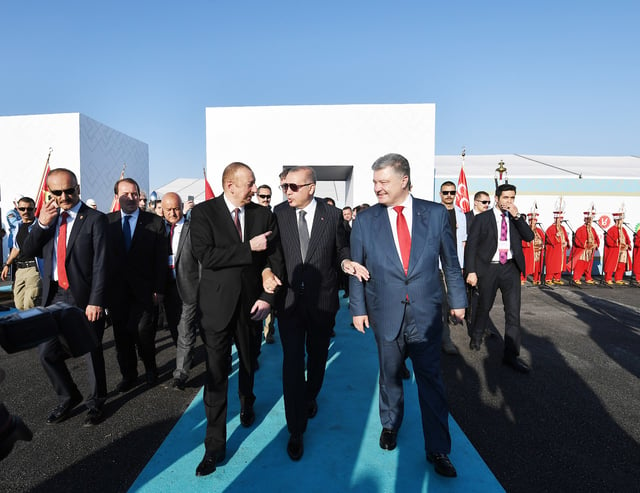
Presidents of Turkey, Azerbaijan and Ukraine at the opening ceremony of the Trans-Anatolian gas pipeline, 12 June 2018
In July 2014, after Mohamed Morsi, Egypt's first president to gain power through an election, was ousted by the military in 2013, Erdoğan labeled newly elected Egyptian President Abdel Fattah el-Sisi an "illegitimate tyrant".[317] The Egyptian Foreign Ministry warned that the Egypt–Turkey relationship would be worsened.[318]
In an interview to the news magazine Der Spiegel, the German minister of defence Ursula von der Leyen said on Friday, 11 March 2016, that the refugee crisis had made good cooperation between EU and Turkey an "existentially important" issue. "Therefore it is right to advance now negotiations on Turkey's EU accession".[321]
In its resolution "The functioning of democratic institutions in Turkey" from 22 June 2016, the Parliamentary Assembly of the Council of Europe warned that "recent developments in Turkey pertaining to freedom of the media and of expression, erosion of the rule of law and the human rights violations in relation to anti-terrorism security operations in south-east Turkey have ... raised serious questions about the functioning of its democratic institutions."[322][323]
Relations between Turkey and Israel began to normalize after Israeli Prime Minister Netanyahu officially apologized for the death of the nine Turkish activists during the Gaza flotilla raid.[324] However, in response to the 2014 Israel–Gaza conflict, Erdoğan accused Israel of being "more barbaric than Hitler",[325] and conducting "state terrorism" and a "genocide attempt" against the Palestinians.[326]
As of 2015, Turkey is actively supporting the Army of Conquest,[327] an umbrella Syrian rebel group that reportedly includes an al-Qaeda linked al-Nusra Front and another Salafi coalition known as Ahrar al-Sham.[328][329] Al-Nusra Front and Islamic State (ISIL) sometimes cooperate with each other when they fight against the Syrian government.[330][331] In late November 2016, Erdoğan said that the Turkish military launched its operations in Syria to end Assad's rule,[332] but retracted his statement shortly afterwards.[333]
In January 2017, Erdoğan said that the withdrawal of Turkish troops from Northern Cyprus is "out of the question" and Turkey will be in Cyprus "forever".[337]
In March 2017, Turkish President Recep Tayyip Erdoğan stated to the Turks in Europe "Make not three, but five children. Because you are the future of Europe. That will be the best response to the injustices against you." This has been interpreted as an imperialist call for demographic warfare.[338]
In June 2017 during a speech, Erdoğan called the isolation of Qatar as "inhumane and against Islamic values" and that "victimising Qatar through smear campaigns serves no purpose".[341]
According to The Economist, Erdoğan is the first Turkish leader to take the Turkish diaspora seriously, which has created friction within these diaspora communities and between the Turkish government and several of its European counterparts.[342]
In December 2017, President Erdoğan issued a warning to Donald Trump, after the U.S. President acknowledged Jerusalem as Israel's capital.[344] Erdoğan stated, "Jerusalem is a red line for Muslims", indicating that naming Jerusalem as Israel's capital would alienate Palestinians and other Muslims from the city, undermining hopes at a future capital of a Palestinian State.[345] Erdoğan called Israel a "terrorist state".[346] Naftali Bennett dismissed the threats, claiming "Erdoğan does not miss an opportunity to attack Israel".[345]
In January 2018, the Turkish military and its Free Syrian Army and Sham Legion allies began a cross-border operation in the Kurdish-majority Afrin Canton in Northern Syria, against the Kurdish-led Democratic Union Party (PYD) and the U.S.-supported YPG Kurdish militia.[347][348] On 10 April, Erdoğan rebuked a Russian demand to return Afrin to Syrian government control.[349]
In February 2018, President Erdoğan expressed Turkish support of the Republic of Macedonia's position during negotiations over the Macedonia naming dispute saying that Greece's position is wrong.[350]
In March 2018, President Erdoğan criticized the Kosovan Prime Minister Ramush Haradinaj for dismissing his Interior Minister and Intelligence Chief for failing to inform him of an unauthorized and illegal secret operation conducted by the National Intelligence Organization of Turkey on Kosovo's territory that led to the arrest of six people allegedly associated with the Gülen movement.[351][352]
In May 2018, British Prime Minister Theresa May welcomed Erdoğan to the United Kingdom for a three-day state visit. Erdoğan declared that the United Kingdom is "an ally and a strategic partner, but also a real friend ... The cooperation we have is well beyond any mechanism that we have established with other partners."[353] Erdoğan also told Theresa May that journalists jailed in Turkey are "terrorists". Turkey has imprisoned more than 160 journalists,[354] making it the world's biggest jailer of journalists.[355]
On 1 August 2018, the U.S. Department of Treasury sanctioned two senior Turkish government ministers who were involved in the detention of American pastor Andrew Brunson.[356] Erdoğan said that the U.S. behavior will force Turkey to look for new friends and allies.[357] The U.S.–Turkey tensions appear to be the most serious diplomatic crisis between the NATO allies in years.[358][359]
The New Zealand and Australian governments and opposition CHP party have criticized Erdoğan after he repeatedly showed video taken by the Christchurch mosque shooter to his supporters at campaign rallies for March 31 local elections and said Australians and New Zealanders who came to Turkey with anti-Muslim sentiments "would be sent back in coffins like their grandfathers" at Gallipoli.[362][363]
In April 2019, Erdoğan said the West Bank belongs to Palestinians, after Israeli Prime Minister Benjamin Netanyahu said he would annex Israeli settlements in the occupied Palestinian territories if he is re-elected.[364]
Image and perception
Early during his prime ministership, Erdoğan was praised as a role model for emerging Middle Eastern nations due to several reform packages initiated by his government which expanded religious freedoms and minority rights as part of accession negotiations with the European Union.[365] However, his government underwent several crises including the Sledgehammer and Ergenekon cases against the Turkish Armed Forces, corruption scandals, accusations of media intimidation, as well as the pursuit of an increasingly polarising political agenda; the opposition accused the government of inciting political hatred throughout the country.[366]
Ottomanism
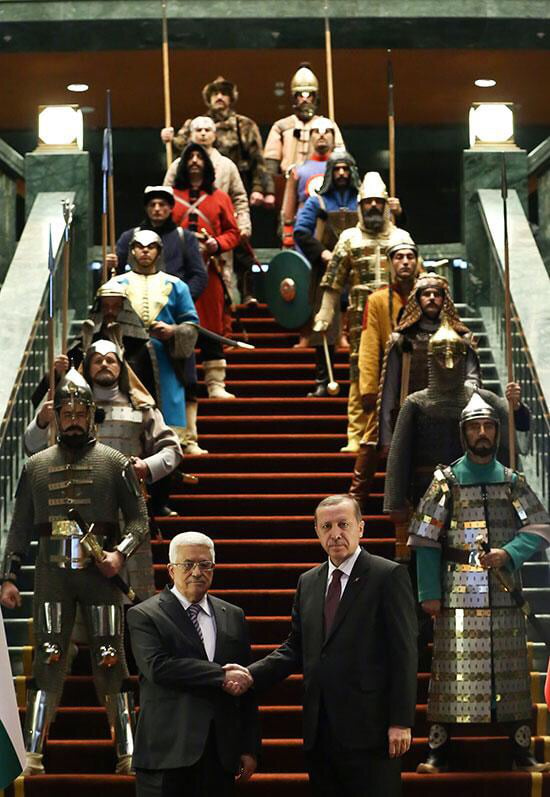
Erdoğan meeting Palestinian President Abbas in Erdogan's Presidential Palace
As President, Erdoğan has overseen a revival of Ottoman tradition, greeting Palestinian President Mahmoud Abbas with an Ottoman-style ceremony in the new presidential palace, with guards dressed in costumes representing founders of 16 Great Turkish Empires in history.[367] While serving as the Prime Minister of Turkey, Erdoğan's AKP made references to the Ottoman era during election campaigns, such as calling their supporters 'grandsons of Ottomans' (Osmanlı torunu).[368] This proved controversial, since it was perceived to be an open attack against the republican nature of modern Turkey founded by Mustafa Kemal Atatürk. In 2015, Erdoğan made a statement in which he endorsed the old Ottoman term külliye to refer to university campuses rather than the standard Turkish word kampüs.[369] Many critics have thus accused Erdoğan of wanting to become an Ottoman sultan and abandon the secular and democratic credentials of the Republic.[370][371][372][373] When pressed on this issue in January 2015, Erdoğan denied these claims and said that he would aim to be more like Queen Elizabeth II of the United Kingdom rather than like an Ottoman sultan.[374]
Authoritarianism
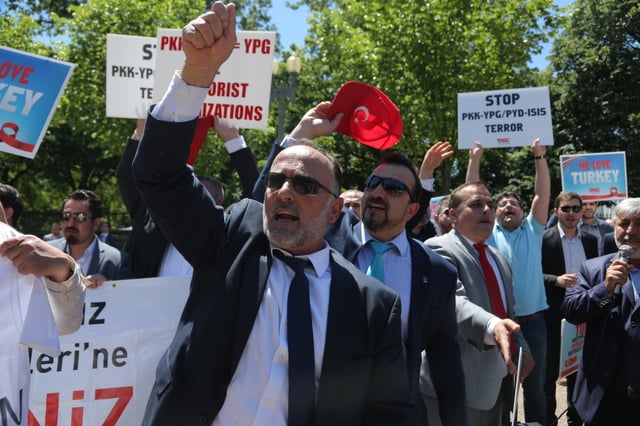
Erdoğan's supporters outside the White House in Washington, D.C., 16 May 2017
In response to criticism, Erdoğan made a speech in May 2014 denouncing allegations of dictatorship, saying that the leader of the opposition, Kemal Kılıçdaroğlu, who was there at the speech, would not be able to "roam the streets" freely if he were a dictator.[375] Kılıçdaroğlu responded that political tensions would cease to exist if Erdoğan stopped making his polarising speeches for three days.[376] One observer said it was a measure of the state of Turkish democracy that Prime Minister Ahmet Davutoğlu could openly threaten, on 20 December 2015, that, if his party did not win the election, Turkish Kurds would endure a repeat of the era of the "white Toros", the Turkish name for the Renault 12, "a car associated with the gendarmarie's fearsome intelligence agents, who carried out thousands of extrajudicial executions of Kurdish nationalists during the 1990s."[377] In February 2015, a 13-year-old was arrested after allegedly criticising Erdoğan on Facebook.[378] In 2016, a waiter was arrested for not serving tea to Erdoğan.[379]
In April 2014, the President of the Constitutional Court, Haşim Kılıç, accused Erdoğan of damaging the credibility of the judiciary, labelling Erdoğan's attempts to increase political control over the courts as 'desperate'.[383] During the chaotic 2007 presidential election, the military issued an E-memorandum warning the government to keep within the boundaries of secularism when choosing a candidate. Regardless, Erdoğan's close relations with Fethullah Gülen and his Cemaat Movement allowed his government to maintain a degree of influence within the judiciary through Gülen's supporters in high judicial and bureaucratic offices.[384][385] Shortly after, an alleged coup plot codenamed Sledgehammer became public and resulted in the imprisonment of 300 military officers including İbrahim Fırtına, Çetin Doğan and Engin Alan. Several opposition politicians, journalists and military officers also went on trial for allegedly being part of an ultra-nationalist organisation called Ergenekon.
Both cases were marred by irregularities and were condemned as a joint attempt by Erdoğan and Gülen to curb opposition to the AKP.[386] The original Sledgehammer document containing the coup plans, allegedly written in 2003, was found to have been written using Microsoft Word 2007.[387] Despite both domestic and international calls for these irregularities to be addressed in order to guarantee a fair trial, Erdoğan instead praised his government for bringing the coup plots to light.[388] When Gülen publicly withdrew support and openly attacked Erdoğan in late 2013, several imprisoned military officers and journalists were released, with the government admitting that the judicial proceedings were unfair.[389]
When Gülen withdrew support from the AKP government in late 2013, a government corruption scandal broke out, leading to the arrest of several family members of cabinet ministers. Erdoğan accused Gülen of co-ordinating a "parallel state" within the judiciary in an attempt to topple him from power. He then removed or reassigned several judicial officials in an attempt to remove Gülen's supporters from office. Erdoğan's 'purge' was widely questioned and criticised by the European Union.[390] In early 2014, a new law was passed by parliament giving the government greater control over the judiciary, which sparked public protest throughout the country. International organisations perceived the law to be a danger to the separation of powers.[391]
Several judicial officials removed from their posts said that they had been removed due to their secularist credentials. The political opposition accused Erdoğan of not only attempting to remove Gülen supporters, but supporters of Mustafa Kemal Atatürk's principles as well, in order to pave the way for increased politicisation of the judiciary. Several family members of Erdoğan's ministers who had been arrested as a result of the 2013 corruption scandal were released, and a judicial order to question Erdoğan's son Bilal Erdoğan was annulled.[392] Controversy erupted when it emerged that many of the newly appointed judicial officials were actually AKP supporters.[393] İslam Çiçek, a judge who ejected the cases of five ministers' relatives accused of corruption, was accused of being an AKP supporter and an official investigation was launched into his political affiliations.[394] On 1 September 2014, the courts dissolved the cases of 96 suspects, which included Bilal Erdoğan.[395]
Accusations of antisemitism
Erdoğan referred to the Turkish novelist and Islamist ideologue, Necip Fazıl Kısakürek, as his muse. Kısakürek was regarded by some analysts, such as Günther Jikeli and Kemal Silay, as the source of his views on Jews.[396][397][398] Kısakürek's publications included the Turkish translation of The Protocols of the Elders of Zion and praise for industrialist Henry Ford's The International Jew, as well as a political program in which he wrote: "Chief among these treacherous and insidious elements to be cleansed are the Dönmeh and the Jews".[399][400][401] In 1974, as president of the Beyoğlu Youth Group of the Islamist MSP Party, Erdoğan wrote, directed and played the lead role in a play titled "Mas-Kom-Ya" (Mason-Komünist-Yahudi [Mason-Communist-Jew]), which presented freemasonry, communism and Judaism as evil.[402] A 2009 report issued by the Israeli Foreign Ministry, said that Erdoğan "indirectly incites and encourages" antisemitism.[403] In 2013, Erdoğan was placed second on the Simon Wiesenthal Center's list of the year's top ten antisemitic personalities, after Erdoğan blamed the "interest rate lobby" as organizers of the mass protests against him in cities around the country in June 2013.[404] In another quote that was regarded as antisemitic, he said "When the word 'media' is pronounced, Israel and Israel's administration comes to mind. They have the ability to manipulate it as they wish." He then claimed that not only the international press but also Turkish newspapers were run by Israel.[405] During the campaign for the Turkish elections in June 2015, Erdoğan accused The New York Times of being represented by "Jewish capital" after foreign media outlets expressed concern over the corrosion of freedom of expression in Turkey.[406][407][408]
As a younger man, in 1974, Erdogan wrote, directed, and gave himself the lead role in the play Mas-Kom-Ya, which presented freemasonry, communism, and Judaism as world evils.[409][410] The play features a Muslim factory worker, who sent his son to Europe where the son became influenced by the West, ultimately ending with a Jewish "agitator" posing as a Muslim Turk and inciting the workers against the factory owner, who dies; at one climatic moment, a devoutly Muslim character shouts "all evil regimes are inventions of Jews!"[411][412]
When during a televised press conference he was asked if he believed a presidential system was possible in a unitary state. Erdoğan affirmed this and cited Nazi Germany as an example of how this is possible.[413] However, the Turkish president's office said that Erdoğan was not advocating a Hitler-style government when he called for a state system with a strong executive. Furthermore, that the Turkish president had declared the Holocaust, anti-semitism and Islamophobia as crimes against humanity and that it was out of the question for him to cite Hitler's Germany as a good example.[414]
In 2014, in response to the Soma mining disaster which killed 300 people, pro-Erdogan Islamist media accused the "Jewish media" and Israel for culpability,[415] and Erdogan himself was filmed saying "why are you running away, spawn of Israel",[416] in what was considered a "clear anti-Semitic slur" by Kemal Silay and Gunther Jikeli.[409]
Suppression of dissent
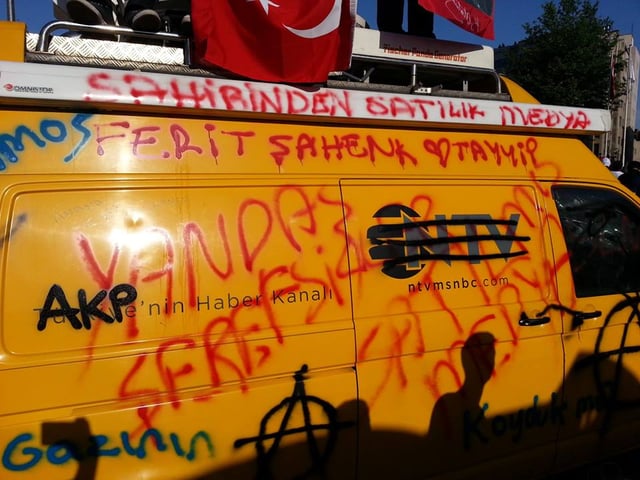
An NTV news van covered in anti-AKP protest graffiti in response to their lack of coverage of the Gezi Park protests in 2013
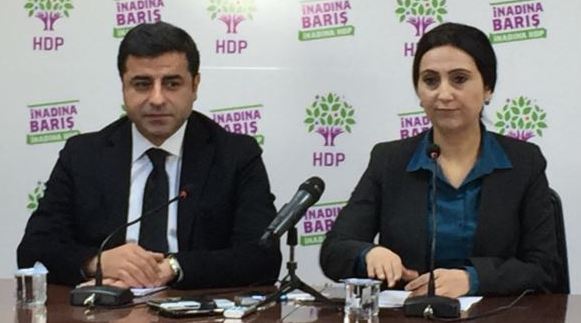
Opposition politicians Selahattin Demirtas and Figen Yüksekdağ had been arrested on terrorism charges
Erdoğan has been criticised for his politicisation of the media, especially after the 2013 protests. The opposition Republican People's Party (CHP) alleged that over 1,863 journalists lost their jobs due to their anti-government views in 12 years of AKP rule.[417] Opposition politicians have also alleged that intimidation in the media is due to the government's attempt to restructure the ownership of private media corporations. Journalists from the Cihan News Agency and the Gülenist Zaman newspaper were repeatedly barred from attending government press conferences or asking questions.[418] Several opposition journalists such as Soner Yalçın were controversially arrested as part of the Ergenekon trials and Sledgehammer coup investigation.[419] Veli Ağbaba, a CHP politician, has called the AKP the 'biggest media boss in Turkey.'[417]
In 2015, 74 US senators sent a letter to US Secretary of State, John Kerry, to state their concern over what they saw as deviations from the basic principles of democracy in Turkey and oppressions of Erdoğan over media.[420]
Notable cases of media censorship occurred during the 2013 anti-government protests, when the mainstream media did not broadcast any news regarding the demonstrations for three days after they began. The lack of media coverage was symbolised by CNN International covering the protests while CNN Türk broadcast a documentary about penguins at the same time.[421] The Radio and Television Supreme Council (RTÜK) controversially issued a fine to pro-opposition news channels including Halk TV and Ulusal Kanal for their coverage of the protests, accusing them of broadcasting footage that could be morally, physically and mentally destabilising to children.[422] Erdoğan was criticised for not responding to the accusations of media intimidation, and caused international outrage after telling a female journalist (Amberin Zaman of The Economist) to know her place and calling her a 'shameless militant' during his 2014 presidential election campaign.[423] While the 2014 presidential election was not subject to substantial electoral fraud, Erdoğan was again criticised for receiving disproportionate media attention in comparison to his rivals. The British newspaper The Times commented that between 2 and 4 July, the state-owned media channel TRT gave 204 minutes of coverage to Erdoğan's campaign and less than a total of 3 minutes to both his rivals.[424]
Erdoğan also tightened controls over the internet, signing into law a bill which allows the government to block websites without prior court order on 12 September 2014.[425] His government blocked Twitter and YouTube in late March 2014 following the release of a recording of a conversation between him and his son Bilal, where Erdoğan allegedly warned his family to 'nullify' all cash reserves at their home amid the 2013 corruption scandal.[426] Erdoğan has undertaken a media campaign that attempts to portray the presidential family as frugal and simple-living; their palace electricity-bill is estimated at $500,000 per month.[427]
In May 2016, former Miss Turkey model Merve Büyüksaraç was sentenced to more than a year in prison for allegedly insulting the president.[428][429][430] In a 2016 news story, Bloomberg reported, "more than 2,000 cases have been opened against journalists, cartoonists, teachers, a former Miss Turkey, and even schoolchildren in the past two years."[431]
Mehmet Aksoy lawsuit
In 2009, Turkish sculptor Mehmet Aksoy created the Statue of Humanity in Kars to promote reconciliation between Turkey and Armenia. When visiting the city in 2011, Erdoğan deemed the statue a "freak", and months later it was demolished.[434] Aksoy sued Erdoğan for "moral indemnities", although his lawyer said that his statement was a critique rather than an insult. In March 2015, a judge ordered Erdoğan to pay Aksoy 10,000 lira.[435]
Honours and accolades
Foreign Honours
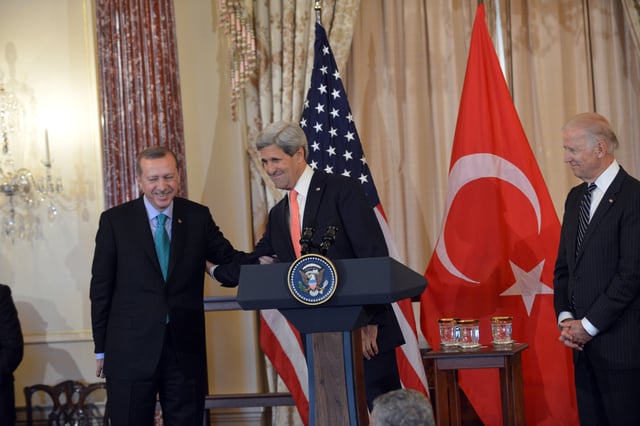
U.S. Secretary of State John Kerry, with U.S. Vice President Joseph Biden, delivers remarks in honor of Erdoğan, 16 May 2013
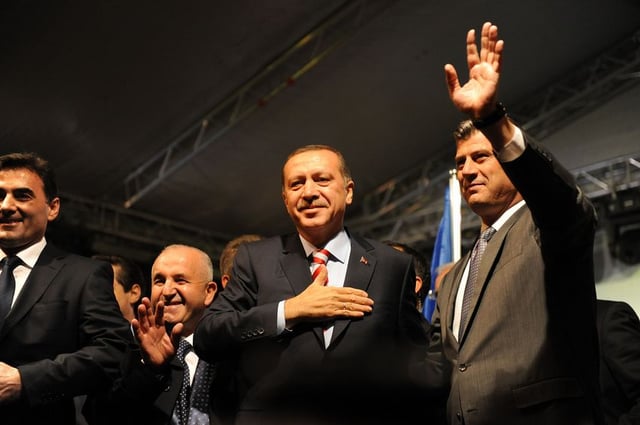
Erdoğan joined by his Kosovo counterpart Hashim Thaçi, 3 November 2010
Russia: State medal; from the President of the Russian Federation (1 June 2006).[436]
Pakistan: Nishan-e-Pakistan, the highest civilian award in Pakistan (26 October 2009)[437]
Georgia: Order of Golden Fleece (17 May 2010) for his contribution to development of bilateral relations.[438]
Kyrgyzstan: Danaker Order in Bishkek (2 February 2011).[439]
Belgium: Grand Cordon in the Order of Leopold.
Madagascar: Knight Grand Cross in the national Order (2017).[440]
Other awards
29 January 2004: Profile of Courage Award from the American Jewish Congress, for promoting peace between cultures.[441] Returned at the request of the A.J.C. in July 2014.[442]
13 June 2004: Golden Plate award from the Academy of Achievement during the conference in Chicago.[443]
3 October 2004: German Quadriga prize for improving relationships between different cultures.[444]
2 September 2005: Mediterranean Award for Institutions (Italian: Premio Mediterraneo Istituzioni). This was awarded by the Fondazione Mediterraneo.[445]
8 August 2006: Caspian Energy Integration Award from the Caspian Integration Business Club.[446]
1 November 2006: Outstanding Service award from the Turkish humanitarian organization Red Crescent.[447]
2 February 2007: Dialogue Between Cultures Award from the President of Tatarstan Mintimer Shaimiev.[448]
15 April 2007: Crystal Hermes Award from the German Chancellor Angela Merkel at the opening of the Hannover Industrial Fair.[449]
11 July 2007: highest award of the UN Food and Agriculture Organization, the Agricola Medal, in recognition of his contribution to agricultural and social development in Turkey.[450]
11 May 2009: Avicenna award from the Avicenna Foundation in Frankfurt, Germany.[451]
9 June 2009: guest of honor at the 20th Crans Montana Forum in Brussels and received the Prix de la Fondation, for democracy and freedom.[452]
25 June 2009: Key to the City of Tirana on the occasion of his state visit to Albania.[453]
29 December 2009: Award for Contribution to World Peace from the Turgut Özal Thought and Move Association.[454]
12 January 2010: King Faisal International Prize for "service to Islam" from the King Faisal Foundation.[455]
23 February 2010: Nodo Culture Award from the mayor of Seville for his efforts to launch the Alliance of Civilizations initiative.[456]
1 March 2010: United Nations–HABITAT award in memorial of Rafik Hariri. A seven-member international jury unanimously found Erdoğan deserving of the award because of his "excellent achievement and commendable conduct in the area of leadership, statesmanship and good governance. Erdoğan also initiated the first roundtable of mayors during the Istanbul conference, which led to a global, organized movement of mayors."[54]
27 May 2010: medal of honor from the Brazilian Federation of Industry for the State of São Paulo (FIESP) for his contributions to industry[457]
31 May 2010: World Health Organization 2010 World No Tobacco Award for "his dedicated leadership on tobacco control in Turkey."[458]
29 June 2010: 2010 World Family Award from the World Family Organization which operates under the umbrella of the United Nations.[459]
4 November 2010: Golden Medal of Independence, an award conferred upon Kosovo citizens and foreigners that have contributed to the independence of Kosovo.[460]
25 November 2010: "Leader of the Year" award presented by the Union of Arab Banks in Lebanon.[461]
11 January 2011: "Outstanding Personality in the Islamic World Award" of the Sheikh Fahad al-Ahmad International Award for Charity in Kuwait.[462]
25 October 2011: Palestinian International Award for Excellence and Creativity (PIA) 2011 for his support to the Palestinian people and cause.[463]
21 January 2012: 'Gold Statue 2012 Special Award' by the Polish Business Center Club (BCC). Erdoğan was awarded for his systematic effort to clear barriers on the way to economic growth, striving to build democracy and free market relations.[464]

